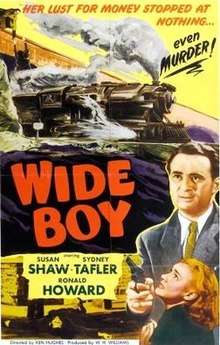Wide Boy (film)
Wide Boy is a 1952 British crime film directed by Ken Hughes and starring Susan Shaw, Sydney Tafler and Ronald Howard.[2]
| Wide Boy | |
|---|---|
 Theatrical release poster | |
| Directed by | Ken Hughes |
| Produced by | William H. Williams executive Nat Cohen Stuart Levy |
| Written by | William Fairchild (uncredited) |
| Based on | an original story by Rex Rienits |
| Starring | Susan Shaw Sydney Tafler Ronald Howard |
| Music by | Eric Spear |
| Cinematography | Josef Ambor |
| Edited by | Geoffrey Muller |
Production company | |
| Distributed by | Anglo-Amalgamated (UK) |
Release date | April 1952 |
Running time | 67 minutes |
| Country | United Kingdom |
| Language | English |
| Budget | £7,000[1] |
Plot
Benny is a black marketeer, dealing in stolen goods; after yet another arrest Benny meets up with his girlfriend Molly, a hairdresser, and they go somewhere different for them, a bar called The Flamingo.
There are only two other customers there at the bar, Robert Mannering and his mistress Caroline Blaine, and it is clear from their conversation that he is a famous surgeon whose wife is dying. Benny notices Caroline's smart handbag, and manages to steal Caroline's wallet. Benny then realises that he recognises Mannering as a famous surgeon. Mannering and Caroline leave shortly afterwards, followed by Benny and Molly, who is unaware of Benny's theft, but Mannering and Caroline return to the bar as they realise that the wallet was stolen by Benny, although the barman George says he did not know Benny as he had never been to the bar before.
Back in his room Benny finds £32 in the wallet, but also a letter from Mannering to Caroline, which makes it clear that he is having an affair with her and that his wife must not find out. He decides to blackmail the couple, and Mannering agrees to pay him as he does not want any scandal as he is trying to get voted onto the Council of the Royal College of Surgeons.
Mannering agrees to meet Benny and pay £200 for the letter, but finds that he has been cheated and does not get the letter back. Benny spends some of the money on a watch for Molly, which he says cost him £60. He then rings up Mannering again, this time asking for £300, but as he goes to the meeting he buys a gun. When he meets Mannering they swap the money and the letter, but Benny tells Mannering, falsely, that he took a photo of the letter and has the negative, suggesting that he intends to continue blackmailing Mannering. The latter grabs hold of Benny, but in the ensuing struggle Benny shoots Mannering dead.
The police investigation soon leads them first to Caroline, and then George, the barman at the Flamingo, who identifies Benny from police files. They go to Benny's address but he manages to escape and goes to a crook, Rocco, to try and get out of the country. Rocco however wants £400, so Benny decides to ask Molly to give him back the watch so that he can raise the money. By chance however Caroline makes an appointment at the hairdressers where Molly works, and inadvertently Molly makes Caroline realise that it was her with Benny in the Flamingo that evening; she then hears a conversation between Molly and Benny on the phone, arranging a meeting at a railway bridge that evening. She tells the police, who are waiting for Benny when he turns up; he tries to escape by scrambling over the bridge but falls to his death on the tracks below.
Cast
- Sydney Tafler - Benny
- Susan Shaw - Molly
- Ronald Howard - Chief Inspector Carson
- Melissa Stribling - Caroline Blaine
- Colin Tapley - Robert Mannering
- Laidman Browne - Pop
- Gerald Case - Detective Sgt Stott
- Glyn Houston - George
- Ian Wallace - Mario
- Dorothy Bramhall - Felicity
- Martin Benson - Rocco
- Helen Christie - Sally
- Peggy Banks - Receptionist
Production
The story was by Rex Rienits who used it for a radio play and a novel. The radio play was meant to be broadcast in 1952 but this was delayed due to concerns by the BBC about its subject matter.[5]
Filming started in Pinewood in December 1951.[6]
Remake
The story was adapted for Australian TV in the TV play Bodgie (1959), where it was relocated to an Australian setting.[7]
References
- Cromwell knocked about a bit The Guardian 16 July 1970: 8.
- WIDE BOY Monthly Film Bulletin; London Vol. 19, Iss. 216, (Jan 1, 1952): 82.
- Ken Hughes Obituary, Variety, 1 May 2001 accessed 26 June 2014
- Ken Hughes Obituary, Telegraph 1 May 2001
- "BROADCAST OF PLAY CANCELLED". The West Australian (Perth, WA : 1879 - 1954). Perth, WA: National Library of Australia. 7 February 1952. p. 9. Retrieved 6 June 2015.
- "Hat-Trick By Film Script Man". The Newcastle Sun. New South Wales, Australia. 20 December 1951. p. 7. Retrieved 3 February 2020 – via Trove.
- "Bodgies in Drama", Sydney Morning Herald, 10 August 1959 p 13